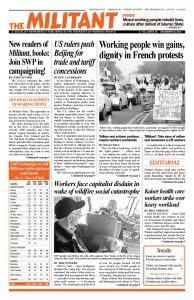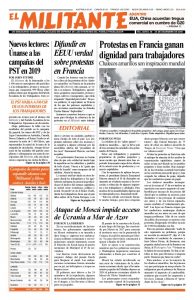At the behest of Washington, Canadian authorities arrested Meng Wanzhou, a top executive and daughter of the founder of the giant Chinese telecom company Huawei, in Vancouver, British Columbia, Dec. 1. This is the latest front in a wider conflict as Washington pushes back against Beijing’s growing economic and political challenge.
The U.S. rulers are the world’s dominant imperialist power, but one that has begun to decline. China’s rapidly expanding capitalist economy is ascending, especially in Asia. But Washington remains on top and is using that position to alter the Chinese rulers’ trade policies.
The U.S. capitalist rulers have made progress in their campaign to press Beijing to retreat. Chinese Vice Premier Liu He told U.S. officials Dec. 10 that the Chinese government has decided to cut its tariffs on U.S. auto imports from 40 to 15 percent. He also said they were considering increasing soybean imports and making changes to their “intellectual property” regulations — other steps Washington has demanded.
This is the most significant move by Beijing since President Donald Trump and Chinese President Xi Jinping met Dec. 1 during the G-20 conference in Buenos Aires, Argentina, and agreed to a 90-day “truce” in new tariffs.
Car manufacturers in the U.S. exported 266,000 vehicles to China in 2017. In addition to aiding U.S. auto bosses, the tariff reduction by Beijing would aid foreign auto companies that have plants in the U.S., like BMW and Daimler. Bosses at those companies had been considering moving production out of the U.S.
Competition over production, trade
The arrest of Meng is part of competition over which power will dominate the next wave of smartphone and other high-tech production. Huawei has grown into the biggest supplier of telecommunications gear in the world. While its stock is valued at less than half that of Apple, it has vaulted into second place behind Samsung as a maker of smartphones.
The company is crucial to Beijing’s “Made in China 2025” plan to become a global leader in industries ranging from computer chips to robotics and electric cars. One of the Chinese rulers’ key goals is to lead in “5G,” the next generation of wireless technology. The Huawei company is at the heart of this effort.
Trump made it clear that the detention of Huawei’s chief financial officer is a negotiating piece for the U.S. rulers. “If I think it’s good for what will be certainly the largest trade deal ever made, which is a very important thing,” he told Reuters, “I would certainly intervene if I thought it was necessary.”
“If the U.S. officials and government want to make a positive effort to promote the settlement of the issue, we welcome that,” Beijing foreign ministry spokesman Lu Kang responded.
The Chinese government has centered its fire over the arrest of Meng against the Canadian rulers, not against Washington. China is second only to the U.S. as Canada’s top trading partner. Beijing detained former Canadian diplomat Michael Kovrig Dec. 11, days after threatening Ottawa with “serious consequences” for the arrest of the Huawei executive.
Meng was released on bail the same day. She had to post $7.5 million, is restricted to Vancouver, has to wear an ankle bracelet, and has to pay for a security detachment to go with her everywhere she goes.
US says Meng violated Iran sanctions
Washington accuses Meng of misleading multinational banks over Huawei’s control of a former company, Skycom, which traded in Tehran in breach of Washington’s sanctions against Iran.
The U.S. government and Washington’s spy agencies have combined to ratchet up restrictions on access to military and other government contracts by Huawei and ZTE, another large Chinese tech firm. In April ZTE faced a seven-year ban on procuring U.S. technology components over charges it violated U.S. sanctions in selling banned equipment to Iran and North Korea. ZTE was saved from bankruptcy by a deal President Trump negotiated with Xi in a phone call. ZTE was again allowed to buy U.S.-made parts and paid a hefty fine.
Beijing has countered Meng’s arrest with some steps to restrict Apple products in China. But these are measured steps. Between its manufacturing and distribution arms, plus software development, Apple has an estimated 4.8 million workers in China.
The best computer chips are still U.S.-designed. Without these and other crucial U.S. inputs, the massive outpouring of electronic equipment made in China would be much inferior.
Four of the five countries in the “Five Eyes” intelligence sharing network — the U.S., Britain, Australia and New Zealand — have blocked Huawei from their new 5G cellular networks over “national security” concerns. Canada, the fifth “eye,” has not yet followed suit. Tokyo, another U.S. ally, has announced Huawei and ZTE will not be allowed to fill official contracts.
The trade disputes between Washington and Beijing plus efforts to defend favored national producers, David Zweig wrote in the Dec. 5 Financial Times, are “a component of a long struggle between a global hegemon — the US — seeking to maintain its dominance, and an ascending challenger — China — that feels it has a moral right to reclaim its status as a great power.”

